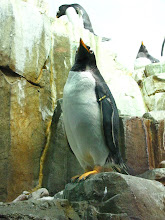A Monster Quest production, this is a search for Giant Squid. 5 parts to the show.
Part 1
Part 2
Part 3
Part 4
Part 5
Saturday, November 29, 2008
Whale Shark Conservation
In addition to the previous blog, here is a well produced film titled Goodwill Hunting on Whale Shark conservation.
World's Largest Fish

The Whale Shark is the world's largest fish with the potential of growing up to 65 feet at a weight of over 10 tons. However while many people think that the larger the animal the more dangerous it is, the Whale Shark is a filter feeder, sifting tiny organisms out of the ocean's water such as plankton and fish eggs, and is harmless to humans despite the fact that it has 3000 tiny teeth. If you ever happened to be swallowed by this fish, it would proceed to "throw you up", turning its stomach inside out to expel you out if its mouth. This process is called gastric eversion.
View the video clip and read about it here.
View the video clip and read about it here.
World's Smallest Fish

The world's smallest fish is a tiny 7.9mm in length! This fish, the Paedocypris progenetica is found on the Indonesian island of Sumatra in forest swamps. Interesting facts: the fish has no skeleton protecting its brain, is the world's smallest vertebrate and lives in acidic waters. The Paedocypris Progenetica's habitat is threatened by logging and other human activities, as well as forest fires.
Read the article by the Natural History Museum of London here.
Read the article by the Natural History Museum of London here.
Friday, November 28, 2008
Ocean Medicine
Humans are always looking for new ways and medicines with which to treat their ailments and diseases. We discovered long ago that many of the things we need (if not all) were available to us through nature. This includes things above and below the water line. The following link to an article published by the Smithsonian describes a search for this medecine through collecting organisms that grow on oil rig platforms. The benefit to collecting such organisms is that through removal you are not damaging a permanent part of the region's ecosystem while still getting a variety of organisms from which to gain possilby invaluable information.
Medicine From The Sea
Medicine From The Sea
Smithsonian Ocean Website
A webisite created by the Smithsonian devoted to things about the ocean. Check it out.
Ecocenter - The Oceans
Ecocenter - The Oceans
Ocean Acidity
This article from "The Underwater Times" is unfortunately the bearer of bad news related to ocean acidity levels. Scientists from the University of Chicago report that the level of ocean acidity is rising 10 times faster than predicted, while the cause remains the same; high levels of carbon dioxide in the atmosphere. With 8 years of data collection, the study focused on temperate regions from which large amounts of fishing are done. Rising acidity levels in the water kills coral which is a crucial part of the marine habitat for many aquatic species. Reducing habitat puts pressure on these species and adds risk to species population diminishing.
This is one of the prime examples of the negative side-effects that the combustion of fossil fuels has on the environment. While CO2 by itself is not harmful, it is the shift in the delicate environmental balance that a surplus of CO2 in the atmosphere creates that causes harm. With hope further research and media attention will motivate the political and industrial world into action to seek out ways to minimize and even reverse some of the negative influence that humans have on the world.
Read the article here.
This is one of the prime examples of the negative side-effects that the combustion of fossil fuels has on the environment. While CO2 by itself is not harmful, it is the shift in the delicate environmental balance that a surplus of CO2 in the atmosphere creates that causes harm. With hope further research and media attention will motivate the political and industrial world into action to seek out ways to minimize and even reverse some of the negative influence that humans have on the world.
Read the article here.
Subscribe to:
Posts (Atom)
